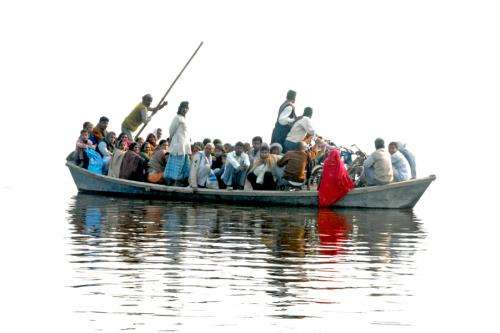A rare insight into human kindness

Lucy Fiske was at a conference in Jakarta about a year ago when she met a young woman on her way to Bogor on the Indonesian island of Java. With other Indonesians, the woman planned to act as a human shield for refugees who were being threatened with violence by a minority extremist group.
Dr Fiske was impressed by their courage and struck, too, by how rare it was to hear about ordinary Indonesian citizens offering assistance to refugees.
"Here was a strong, civil-minded group of people helping refugees," says Dr Fiske, a human rights and gender justice researcher who has been studying refugee issues for more than a decade.
"I wondered if there were other links between refugees and the Indonesian community that allowed some of the refugees to work and get help. Could this be an alternative form of protection that we needed to explore?"
That question now forms the basis of Dr Fiske's research project for her 2014 Chancellor's Postdoctoral Fellowship from the University of Technology, Sydney (UTS). The fellowship is funded for four years.
The postdoctoral scheme has given Dr Fiske, originally from Curtin University, an opportunity to conduct research designed to help shift thinking on asylum seekers by investigating the lives of refugees living without formal protection in Malaysia, Indonesia and Thailand.
In December, things became more difficult for those refugees trying to get to Australia when the federal government – which wants Indonesia to put more refugees in detention – capped the number of permanent protection visas for asylum seekers. The situation for hundreds of thousands of other refugees in South-East Asia is also dire because they have little legal protection.
According to the United Nations High Commissioner for Refugees (UNHCR), several countries in South-East Asia have generously hosted large numbers of refugees for decades, but the region lacks strong legal frameworks for their protection.
Just before Christmas, Dr Fiske visited the Indonesian town of Cisarua, a temporary home for many refugees fleeing war in their home countries such as Pakistan, Afghanistan and Sri Lanka. In the first of what she hopes will be several similar trips, she discovered a network of informal protection for asylum seekers, within their own cultural groups, within the wider refugee community and from Indonesians themselves.
Many refugees in Indonesia end up in Cisarua where they wait for their cases to be processed by UNHCR. Others are there to board a boat for Australia. They live in spartan accommodation, often with several families in one house, and usually have little more than two sets of clothes. They are not allowed to work and their children don't go to school.
"Many of these people live their entire lives without being able to access formal protection, with no residency rights and no citizenship. And they can't return to their country," says Dr Fiske.
It is a precarious existence that leaves people open to exploitation in the housing and job markets.
"But they do forge out lives," says Dr Fiske. "They get married; they raise children … My project looks at how they do that."
"I interviewed about 30 refugees while I was there. The majority of the local community seemed to be friendly and welcoming [of the refugees]. Some business owners wanted them there because they spend money in the community but there is a small extremist group that doesn't want them … In the case of most Indonesians I met, they don't care about [religion]."
Muslim refugees weren't allowed to worship at the mosque but sometimes, the town's imam would show them where fellow countrymen were living. Sri Lankan refugees were given lunch every day by the local Hindu temple.
"They are forbidden by law to work but they are also acutely aware that many Indonesians still live in poverty, many of them working as street vendors. The refugees can't start their own small enterprises because they would be competing with local traders, which would likely test relationships with the local community too much."
Help came in the form of advice and assistance from other refugees or the Jesuit Refugee Service - but sometimes from unexpected quarters. For example, a young Pakistani woman living in the town with her husband and small child had no other women to talk to. Her Indonesian neighbour, who also had a small child, befriended her.
"Despite the language barrier they spent a lot of their time together," says Dr Fiske.
"I was really moved by stories they told me about helping each other … It is more of a goodwill story than I expected because of the care from Indonesians. But no one hears about that side of the story in Australia. These voices need to be heard."
Provided by University of Technology, Sydney



















